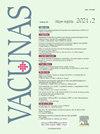Acceptance of malaria vaccine among mothers of under-five children in Nigeria: Results from the M-VAN survey
Q3 Medicine
引用次数: 0
Abstract
Background
Malaria is one of the most common causes of death among children under 5 years of age in sub-Saharan Africa. Nigeria accounts for 1 in every 4 global malaria incidences and deaths. We evaluated the prevalence and correlates of malaria vaccine acceptance among mothers of children under 5 years in Nigeria.
Methods
A convenient sample of mothers of children under the age of 5 was recruited via a cross-sectional online survey conducted between 20 and 25 October 2021. Participants who replied ‘yes’ to a questionnaire assessing their willingness to accept the malaria vaccine were considered “acceptant”. We fit a multivariate logistic regression model to report the adjusted odds ratio (aOR) and 95% confidence interval (CI) for the factors associated with vaccine acceptance.
Results
Among the 595 participants (mean age 35 years [SD; 9.84]), 463 (77.82%) were willing to accept a malaria vaccine for their children. The results of our multivariable analysis showed that belonging to the Hausa tribe is associated with significantly higher odds of acceptance, compared to Igbo (aOR: 2.78, 95% CI:1.09–7.14) and other tribes (aOR:2.27, 95% CI: 1.11–4.55). The most common reasons for malaria vaccine acceptance include preventing the development of complicated malaria, reducing the frequency of malaria episodes in children, improving a child's quality of life, and reducing the number of school hours lost to malaria.
Conclusion
Further efforts are needed to understand the cultural barriers to malaria vaccine acceptance in order to maximize malaria vaccine uptake when the actual vaccine roll-out commences.
尼日利亚五岁以下儿童的母亲对疟疾疫苗的接受程度:M-VAN 调查的结果
背景疟疾是撒哈拉以南非洲 5 岁以下儿童最常见的死因之一。全球每 4 例疟疾发病和死亡病例中就有 1 例发生在尼日利亚。我们评估了尼日利亚 5 岁以下儿童的母亲接受疟疾疫苗的普遍程度和相关因素。方法在 2021 年 10 月 20 日至 25 日期间通过横断面在线调查招募了 5 岁以下儿童母亲的方便样本。对评估其接受疟疾疫苗意愿的问卷作出 "是 "回答的参与者被视为 "接受"。我们拟合了一个多变量逻辑回归模型,以报告与疫苗接受度相关因素的调整赔率比 (aOR) 和 95% 置信区间 (CI)。结果在 595 名参与者(平均年龄 35 岁 [SD; 9.84])中,463 人(77.82%)愿意为其子女接种疟疾疫苗。我们的多变量分析结果显示,与伊格博族(aOR:2.78,95% CI:1.09-7.14)和其他部落(aOR:2.27,95% CI:1.11-4.55)相比,属于豪萨部落的人接受疟疾疫苗的几率要高得多。接受疟疾疫苗的最常见原因包括预防复杂性疟疾的发展、减少儿童疟疾发作的频率、提高儿童的生活质量以及减少因疟疾而损失的学时。
本文章由计算机程序翻译,如有差异,请以英文原文为准。
求助全文
约1分钟内获得全文
求助全文
来源期刊

Vacunas
Medicine-Infectious Diseases
CiteScore
3.90
自引率
0.00%
发文量
138
审稿时长
62 days
期刊介绍:
Sin duda una de las mejores publicaciones para conocer los avances en el campo de las vacunaciones preventivas, tanto en el ámbito de la investigación básica como aplicada y en la evaluación de programas de vacunaciones. Su alta calidad y utilidad la ha llevado a estar indexada en los prestigiosos índices IME y SCOPUS.
 求助内容:
求助内容: 应助结果提醒方式:
应助结果提醒方式:


